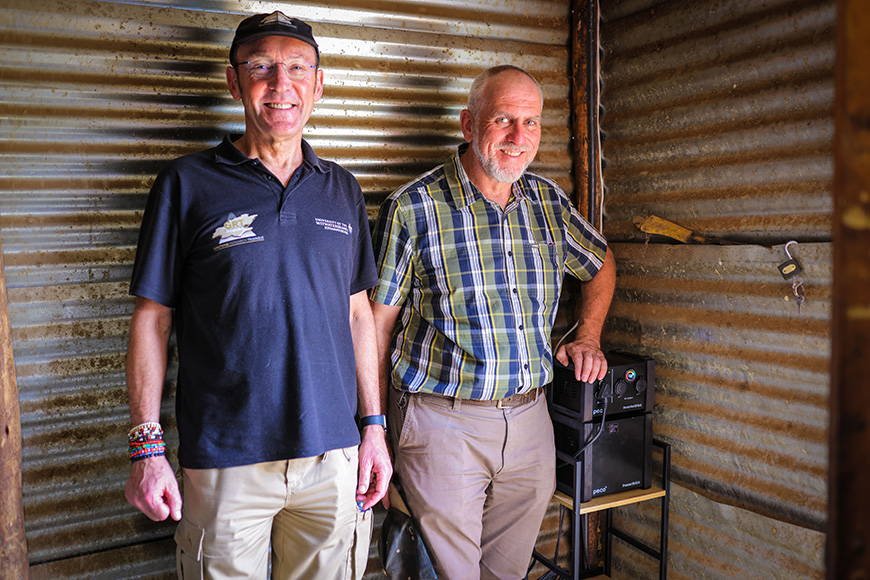Sun-powered microgrid study launched in Pretoria
- Wits University
The Pecogrid pilot study will examine the viability of the large-scale rollout of microgrid inverter systems in informal communities.
Wits University, together with its partners in the Gauteng Research Triangle, have started a pilot project to study the potential of introducing small portable solar power systems into informal housing communities to provide electricity.
 The project, that makes use of the Pecogrid power brick, developed by Professor Willie Cronje of the Wits School of Electrical and Information Engineering, aims to look at the viability of installing small microgrids into informal communities to assist in providing energy to these communities, while it may at the same time act as an income generator for individuals.
The project, that makes use of the Pecogrid power brick, developed by Professor Willie Cronje of the Wits School of Electrical and Information Engineering, aims to look at the viability of installing small microgrids into informal communities to assist in providing energy to these communities, while it may at the same time act as an income generator for individuals.
The project was launched after Professor David Everatt, Professor of Urban Governance at the Wits School of Governance, and Professor Imraan Valodia, Pro-Vice Chancellor: Climate, Sustainability and Inequality, wrote an opinion piece in the Daily Maverick news website, arguing that informal settlements could drive South Africa’s solar revolution.
Because of enlightened self-interest, the authors argued, solar power in these communities could provide dwellings with power, while at the same time producing a source of revenue for house owners if the power is sold back to the grid.
“As these households are not connected to the grid at the moment, local government will not lose any revenue, should these communities – who are in desperate need for energy – be connected to solar power,” said Everatt. “So, if they are connected with solar energy, and have excess energy that they can sell to local government for cash, they will not only have energy, but will earn a much-needed income, which is a win-win to everybody involved.”
The local community will be energised, the grid will be less strained as these communities feed energy into the grid, and over time, the government will spend less in social grants as households will get an income.
As part of the pilot study, technicians from Lightec installed two Pecogrid solar systems at houses in Kirkney, in Pretoria West. The systems both consisted of a portable Peco-brick – a 200 Watt inverter unit, connected to a 500 Watt Hour lithium-ion battery – connected to a 160 Watt solar panel. One of the systems was connected to the Eskom grid, while the other was a completely off-grid system.
“The whole system is based on so-called ‘plug-and-play’ technology, where you can buy the equipment at a vendor, go home, connect the wires to the solar panel and you’re done,” said Cronje, who spent the last 10 years developing the system. “We put a lot of effort in making the technology as simple as possible, so you don’t need a professional electrician to install it.”
A typical single-brick power system can power the lights in an informal dwelling, while also providing enough power to charge a cell phone. Additional batteries or power-bricks could be added to increase capacity to power a television and even a fridge.
“The system is modular, so you can add on further capacity as your economic circumstances changes,” said Mario Roos, CEO of Lightec. Even if you’re moving into a formal housing structure, you can unclip the panel from the roof, take your little portable unit with you and connect it to your new house.”
Everatt said the pilot study will run for six months to a year, to see whether the system can be used safely and sustainably, and whether it would add to the quality of life and economical livelihoods of the communities.
“The proof of concept is to see whether it generates excess power once the household used what they needed. The excess power will then be used by the whole community to charge their cell phones.”
The Gauteng Research Triangle (GRT) is a collaboration of the three research universities: University of the Witwatersrand, the University of Pretoria and the University of Johannesburg in Gauteng. Following a multidisciplinary approach, the GRT aims to ensure the analysis of vital statistics, migration and other key data generated from multiple angles.
The GRT operates a research node in Atteridgeville and Melusi in Pretoria for the South African Population Research Infrastructure Network (SAPRIN), a major investment in research infrastructure which aims to help South Africa respond to some of its biggest issues – including poverty, inequality, unemployment, lack of access to effective health care – and now to Covid-19.

